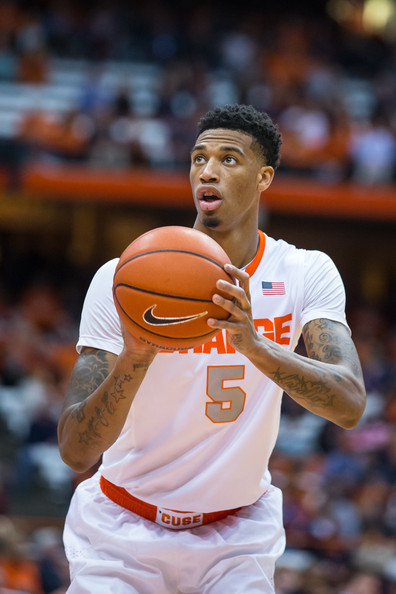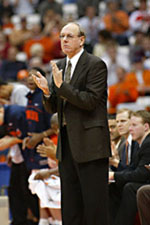Conference play has just begun for Syracuse, so there is
still a long way to go in the season. However,
at this point in time,
Rakeem Christmas has made an amazing jump in his
performance from his junior year to his senior year. This is causing a lot of discussion among
Syracuse fans on whether this is the best increase between a junior and senior
season.
In 2013-2014, Christmas averaged
5.8 ppg, and often was pulled early in the game by a frustrated
JimBoeheim. In 2014-2015, Christmas is the focal point of the offense, and is
scoring 17.3 ppg. Not only is his
production up, but he seems to move with more grace and ease on the court,
shows a wider variety of moves, and a more aggressive style. There are still
weaknesses to his game, and the tough part of the schedule is still a month
away, but Christmas has definitely made huge strides.
How does Christmas compare to other seniors who made great
strides their senior year? Chronologically…
In 1919-1920, forward
Nick Paul led the Orangemen in scoring
with 13.5 ppg, and was the team’s designated free throw shooter. Paul was 8.5
ppg better than runner up Ken Lavin. He
led the team to a 15-3 record. As a
junior Paul played in only four games and scored 10 points. A
rather remarkable performance for a man who had played only 5 games in his
career prior to his senior year.
Syracuse won its last 13 games of the season, and Paul was the leading
scorer in each game.
In 1951-1952, guard
Bucky Roche was second in scoring on the
team with 14.0 ppg. His junior year he
had scored 4.6 ppg. Roche’s highlight of
the season was a 35 point game in a tight win over rival Cornell.
In 1968-1969, forward
Bob Kouwe was second in scoring with
14.0 ppg, and had 6.5 rebounds per game.
He had only 4.0 ppg and 2.8 rpg in a junior season that was cut short by
a team suspension. Kouwe would have a
career high 27 points in a one point win over rival Colgate.
In 1980-1981, center
Danny Schayes led the Orangemen in
scoring and rebounding with 14.6 ppg and 8.3 rpg. He shot 82% from the free throw line and 58%
from the floor. He had only 5.9 ppg and
4.5 rpg his junior year. Schayes had
always been a fundamentally sound player, but he was stuck behind Roosevelt
Bouie for three years. Boeheim tried a
twin tower approach with Schayes and Bouie both on the court, but that did not
work well as neither player was suited for the forward position.
In 1986-1987, guard
Greg Monroe would increase his scoring
from 4.6 ppg to 12.9 ppg, along with doubling his rebounding and assist
efforts. Monroe could always play, but
he lacked the playing time being stuck behind Pearl Washington and Rafael
Addison. The unknown that Monroe brought
to the game was his three point shooting. This was the first season of three
point shooting in the NCAA, and Monroe proved to be very good at it, hitting
43.9% of his shots. That, along with his senior leadership, was a great factor
in allowing the Orangemen to make a run at the National Championship.
In 1995-1996, point guard
Lazarus Sims would develop into a
fantastic playmaker, averaging 7.4 assists per game, along with 3.7 rpg. He
wasn’t counted on to score, averaging only 6.3 ppg, but he shot well enough
(36% from three point range and 75% from the free throw line) to keep teams
honest. Sims would help guide the
Orangemen to the National Championship game against Kentucky, and his
playmaking was the second biggest factor behind big John Wallace. Sims only played 441 minutes his junior year,
averaging 2.6 apg, 1.4 rpg, and 3.0 ppg, as he sat behind Michael Lloyd and
Lawrence Moten.
In 2000-2001 point guard
Allen Griffin would dwarf his
junior year statistics. He had 10.8 ppg,
6.5 apg, and 3.3 rpg, versus 3.0 ppg, 1.7 apg, and 1.1 rpg. However, Griffin’s career was strange, as he
was a healthy but seldom used junior player who was stuck behind guards Jason
Hart, Tony Bland, DeShaun Williams and swingman Preston Shumpert. As a sophomore, Griffin had been a starter
and had a decent season, so while his senior year was a huge leap from his
junior, it was not a huge leap from his sophomore. Griffin did have to huge games his senior
year; he recorded a triple double in a win over Pitt, and the next game he
would score 31 points in a 2 point win over St. John’s.
In 2006-2007, forward
Demetris Nichols went from having a
good junior year to an excellent senior year.
Nichols had 13.3 ppg as a junior, but he rose that to 18.9 ppg as a
senior. Nicholas became more efficient
as he improved his shooting touch, and was more prolific. He increased his
three point shooting from 36% to 42%, and his free throw shooting from 68% to
85%. Nichols would score 37 points and have 10 rebounds in a two point win over
St. Johns.
In 2010-2011, forward
Rick Jackson made significant strides
in his play, even if the statistical numbers weren’t as strong as some other
candidates. Jackson increased his
scoring from 9.7 ppg to 13.1 ppg, and his rebounds from 7.0 rpg to 10.3
ppg. Defensively he became the Big East
Defensive Player of the Year. He was far
more consistent offensively, as opposed to his junior season where he often
disappeared.
If I were to choose a player, prior to this season, I would
have to go with Lazarus Sims. I did not
see the first three players I mentioned, and statistically speaking, Nick Paul
had the best improvement of any Syracuse player ever, especially in the context
of his era. But I did not see him play.
Sims ran the offense spectacularly his senior year, and with
his size was a strong defensive presence at the top of the key. This from a player that almost transferred
earlier in his career, and a player that Jim Boeheim was shaky enough about
that he recruited a junior college player (Lloyd) to play the point
instead. The fact that Syracuse went to
the national championship game speaks a lot about Sims improvement.
Many of the players listed above may not have benefited from significant improvement in their play, but rather from finally getting the opportunity to play. That is always tough to tell. Christmas is a little bit clearer because he has been given the opportunity to play, and never took hold of it. He has been a starter his whole career, but has also been the victim of many quick hooks.
If Christmas keeps up his pace, and the Orange make some
noise in the post season, I would be apt to make him the most improved senior
ever. We will have to see how it plays
out.









